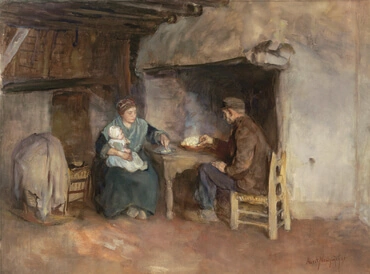1
那兩個天使晚上到了所多瑪;羅得正坐在所多瑪城門口,看見他們,就起來迎接,臉伏於地下拜,
2
說:我主阿,請你們到僕人家裡洗洗腳,住一夜,清早起來再走。他們說:不!我們要在街上過夜。
3
羅得切切的請他們,他們這才進去,到他屋裡。羅得為他們預備筵席,烤無酵餅,他們就吃了。
4
他們還沒有躺下,所多瑪城裡各處的人,連老帶少,都來圍住那房子,
5
呼叫羅得說:今日晚上到你這裡來的人在那裡呢?把他們帶出來,任我們所為。
8
我有兩個女兒,還是處女,容我領出來,任憑你們的心願而行;只是這兩個人既然到我舍下,不要向他們作甚麼。
9
眾人說:退去罷!又說:這個人來寄居,還想要作官哪!現在我們要害你比害他們更甚。眾人就向前擁擠羅得,要攻破房門。
11
並且使門外的人,無論老少,眼都昏迷;他們摸來摸去,總尋不著房門。
12
二人對羅得說:你這裡還有甚麼人麼?無論是女婿是兒女,和這城中一切屬你的人,你都要將他們從這地方帶出去。
13
我們要毀滅這地方;因為城內罪惡的聲音在耶和華面前甚大,耶和華差我們來,要毀滅這地方。
14
羅得就出去,告訴娶了(或作將要娶)他女兒的女婿們說:你們起來離開這地方,因為耶和華要毀滅這城。他女婿們卻以為他說的是戲言。
15
天明了,天使催逼羅得說:起來!帶著你的妻子和你在這裡的兩個女兒出去,免得你因這城裡的罪惡同被剿滅。
16
但羅得遲延不走。二人因為耶和華憐恤羅得,就拉著他的手和他妻子的手,並他兩個女兒的手,把他們領出來,安置在城外;
17
領他們出來以後,就說:逃命罷!不可回頭看,也不可在平原站住。要往山上逃跑,免得你被剿滅。
19
你僕人已經在你眼前蒙恩;你又向我顯出莫大的慈愛,救我的性命。我不能逃到山上去,恐怕這災禍臨到我,我便死了。
20
看哪,這座城又小又近,容易逃到,這不是一個小的麼?求你容我逃到那裡,我的性命就得存活。
22
你要速速地逃到那城;因為你還沒有到那裡,我不能作甚麼。因此那城名叫瑣珥(就是小的意思)。
24
當時,耶和華將硫磺與火從天上耶和華那裡降與所多瑪和蛾摩拉,
25
把那些城和全平原,並城裡所有的居民,連地上生長的,都毀滅了。
28
向所多瑪和蛾摩拉與平原的全地觀看,不料,那地方煙氣上騰,如同燒窯一般。
29
當神毀滅平原諸城的時候,他記念亞伯拉罕,正在傾覆羅得所住之城的時候,就打發羅得從傾覆之中出來。
30
羅得因為怕住在瑣珥,就同他兩個女兒從瑣珥上去,住在山裡;他和兩個女兒住在一個洞裡。
31
大女兒對小女兒說:我們的父親老了,地上又無人按著世上的常規進到我們這裡。
32
來!我們可以叫父親喝酒,與他同寢。這樣,我們好從他存留後裔。
33
於是,那夜他們叫父親喝酒,大女兒就進去和他父親同寢;他幾時躺下,幾時起來,父親都不知道。
34
第二天,大女兒對小女兒說:我昨夜與父親同寢。今夜我們再叫他喝酒,你可以進去與他同寢。這樣,我們好從父親存留後裔。
35
於是,那夜他們又叫父親喝酒,小女兒起來與他父親同寢;他幾時躺下,幾時起來,父親都不知道。







